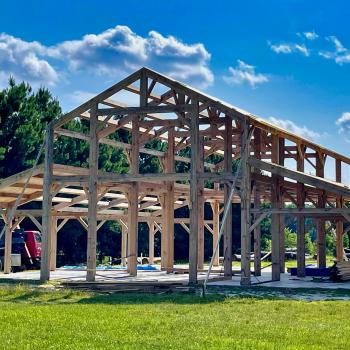Adventure travel and extreme sports are becoming more and more popular in our culture. People are pushing themselves into CrossFit gyms and triathlon races. We have become an ‘extreme’ culture, jumping out of airplanes, riding roller coasters, swimming with sharks. It’s as if there is a part of us that feels most alive the closer we get to death. Something in us realizes that there are things in life not just worth living for, but worth dying for as well.

Last week, a coworker at our church commented on how my wife and I are involved in a lot of things at the church; youth ministry, leading a college community group, being a part of our own community group, and a handful of other service projects. My response to my coworker was simple: ‘Well, this is what we live for.’
The very same day I rode the subway home. During the trip I was reading a book with the word ‘Bible’ on the cover. I suddenly felt nervous. After all, New York City is not exactly a hotbed for Christian faith. The city has some pretty intense and opinionated people, and the thought of someone attacking me just for being a Christian crossed my mind. In that moment I realized my shirt had the name of our church on the back of it as well.
I turned (not proud of this) in such a way that people might not see the shirt. I shifted the weight of my forearm to cover the word ‘Bible’, afraid of a confrontation. Afraid of offending others. Afraid of getting hurt.
Perhaps my biggest challenge in living the life I want is that I am not always willing to die for what I am willing to live for.
Test My Mettle
The reason extreme sports are so popular is because we realize that purpose comes with sacrifice. Marriage costs me something as well as giving me something. We feel more alive after sacrifice, more purpose in the wake of perseverance. We find a deeper joy when we realize that anything truly worth living for is also worth dying for.
Perhaps this is why all that we do in life follows the pattern of The Mood Curve. Deep and consistent meaning travels through the medium of despair and delight. Purpose is a tenant in all of life’s settings. Circumstances are just terrain for the journey.
The greatest numbing agent for stepping into the life we want to live is that we are terrified of the risk. We know it is worth living for. But is the living worth dying for? We end up in a purgatory of sorts. We end up complacent and apathetic, longing for superficial glimpses of joy and adrenaline filled brushes with death. Our soul is dying for both, to live and to die. G.K. Chesterton said this: “Courage is almost a contradiction in terms. It means the strong desire to live taking the form of a readiness to die.”

We are so afraid of death we never quite figure out how to live.
I cannot be involved in the joys of living for the Gospel in New York City without exposing myself to the dangers. To shrink away from one will cost me the other.
The irony is that the fear of death keeps us from life.
I am not suggesting we shouldn’t be cautious, prudent, or wise. We can overcorrect in favor of death just as much as we can cling to the favor of superficial living.
What I am suggesting is that love is going to cost you something. Purpose comes at a price, and the cost increases the worth. The risk reaps greater reward.
Fear Invites Us Into Deeper Love
As we decide what we are going to be living for, what our life is going to be about, we are constantly building little “out” clauses. I can lean against the subway doors, keep my Bible in my backpack, not talk about Jesus to strangers. In doing so, however, I end up selling my soul to save my life.
When the book of 1 John talks about how perfect love casts out fear, I think it has all of this in mind. Why am I afraid for my body, of the perspective of others, and the grumbling of the crowd? Yet, at the same time, my soul is longing for risk, to lean into death without being overcome by it. It is because of this: Love is the master of all, the experience of all, the fulfillment of all. It fears nothing because there is nothing in which it cannot make itself known. When we face fear, we discover either the limits of our love or a barrier for it. In this way, fear asks us just how deep our love goes.
Suffering tests commitment. It measures our values. I am willing to jump in front of a bullet for my wife just as much as I am prepared to kiss her. How many other things are so Transcendent in my life that I am willing to both live and die for them?












